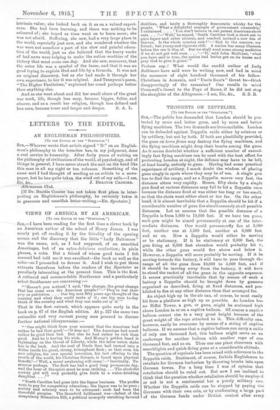VIEWS OF AMERICA BY AN AMERICAN. pro Tns EDITOR Or
Tax "Brsorrroa."1 SIB,,—I have been reading for the first time a clever book by an American author of the school of Henry James. I was nearly put off reading it by the frivolity of the opening scenes and the discovery that the little "Lady Baltimore" was the name, not, as I had supposed, of an ennobled Americans, but of an extra-delicious confection; in plain phrase, a cake. But a friend of whose good taste I felt assured had told me it was excellent—the book as well as the cake—so I proceeded to devour it. And I wish to put three extracts therefrom before the readers of the Spectator as peculiarly interesting at the present time. This is the first. A cultured and commendable Northerner and a particularly select Southerner are conversing ;— " 'Haven't you noticed,' I said, the change, the great change that has come over the American people P They've lost their grip on patriotism.. . . Our big men fifty years ago thought of the country and what they could make of it; our big men to-day think of the country and what they can make out of it.'" That is the first extract, which appears quite early in the book on p. 67 of the English edition. At p. 327 the same two estimable and very earnest young men proceed to dismiss further national idiosyncrasies ;— "`One might think from your account that the American had rather be had than good.'—' 0 dear no I The American bad much rather be good than bad. But also he bad rather be rich than good. And ho is having his wish. And Money's golden hand is tightening on the throat of Liberty, while the labor union stabs her in the back. And the soul of Uncle Sam had turned into a dollar inside his great, strong, triumphant flesh ; so that even his new religion, his own special invention, his last offering to the creeds of the world, his Christian Science, is based upon physical benellt.'—' Well, a moral awakening will eorne.'—' Inevitably. To- morrow perhaps. The flesh has had a good long prosperous day, and the hour of the spirit must be near striking.... The alcoholic society girl will very probably give birth to a water-drinking daughter. . . ."
" South Carolina had gone into the liquor business. The profits were to pay for compulsory education; the liquor was to be pure ; society and sobriety were to be advanced: such had been the threefold promise. The threefold fulfilment was—defeat of the Compulsory Education Bill, a political monopoly enriching favored distillers, and lately a thoroughly democratic whisky for the people. What a delightful example of government ownership,' I exclaimed. . . . You don't believe in our patent American short
outs. . . Well,' he mused, South Carolina took a short out le pure liquor and sober citizens, and reached instead a new den of
thieves. Is the whole country sick P Sick to the marrow, my friend ; but young and vigorous still. A nation has many illnesses before the one it dies of. But we shall need some strong medicine if we do not get well soon. . . If,' said John lieGrant, what you have said is true, the nation had better get on its knees and pray God to give it grace.'" Verbunt sap. .1 What would the candid author of Lady Baltimore have said were he writing now, and bad in mind the massacre of eight hundred thousand of his fellow- Christians in Armenia, and "Uncle Sam's" threat to—think disapprovingly of the assassins P One recalls to mind Cromwell's threat to the Pope of Rome, if he did not stop the slaughter of the Albigenses.—I am, Sir, &o., S. S. B.
















































 Previous page
Previous page